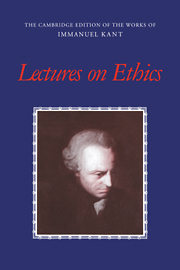Book contents
- Frontmatter
- Contents
- General editors' preface
- Acknowledgments
- Introduction by J. B. Schneewind
- PART I Kant's practical philosophy: Herder's lecture notes (selections)
- PART II Moral Philosophy: Collins's lecture notes
- PART III Morality according to Prof. Kant: Mrongovius's second set of lecture notes (selections)
- PART IV Kant on the metaphysics of morals: Vigilantius's lecture notes
- Select Bibliography
- Explanations of names
- German-English glossary
- English-German glossary
- Name index
- Subject index
PART I - Kant's practical philosophy: Herder's lecture notes (selections)
Published online by Cambridge University Press: 05 May 2013
- Frontmatter
- Contents
- General editors' preface
- Acknowledgments
- Introduction by J. B. Schneewind
- PART I Kant's practical philosophy: Herder's lecture notes (selections)
- PART II Moral Philosophy: Collins's lecture notes
- PART III Morality according to Prof. Kant: Mrongovius's second set of lecture notes (selections)
- PART IV Kant on the metaphysics of morals: Vigilantius's lecture notes
- Select Bibliography
- Explanations of names
- German-English glossary
- English-German glossary
- Name index
- Subject index
Summary
… Do I have, not merely a self-interested feeling, but also a disinterested feeling of concern for others? Yes – the weal and woe of another touches us directly: the mere happiness of another pleases us in the telling: even that of fictional persons whose tale we know of, or in distant ages – this common concern is so great that it collides with the self-interested feeling. The sense of it is indeed a noble feeling, nobler than the self-interested one. Nobody despises it: everyone wishes for it, though not all have it in the same degree; in some it is great, and the greater it is, the more it is felt as a perfection. It is universal, though seldom so great that it inspires active exertions – in misers, for example, with whom self-interest has become very strong. As needy beings the creator gave us self-interest in our own perfection. As beings who have the power to be of service to our fellows, He gave us a disinterested concern for the perfection of others. The concern for others ranks high, since even the concern for self can be subordinated to it, but not vice versa. The more self-interested, the poorer (at least in thought), and hence the more to be despised. The disinterested feeling for the welfare, etc., of another has our own perfection, not as an end, but as a means.
- Type
- Chapter
- Information
- Lectures on Ethics , pp. 1 - 36Publisher: Cambridge University PressPrint publication year: 1997
- 1
- Cited by



